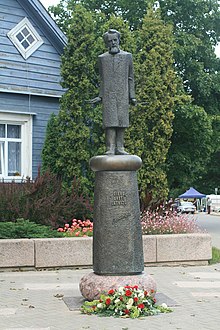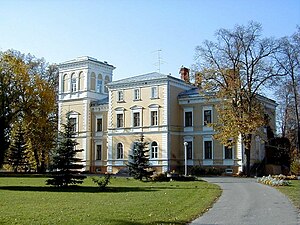Limbaži is a small town of about 6900 inhabitants (as of 2021) in northern Latvia, in what's defined by Wikivoyage as the Riga region. A former Hanseatic city with a residence of the Archbishop of Riga in the Middle Ages, most attractions are from a later times, still relatively few visitors find their way here.
Understand
Limbaži started off as a settlement by the Livonian people named Lemisele, translating to something like "an island in a swampy forest". In 1223, during the Livonian Crusades, the Archbishop of Riga had a castle built on the site of the settlement, and a new town with the German name Lemsale started growing around it. In those days the Svētupe River provided access to the Baltic Sea, Lemsale became part of the Hanseatic League, and ships from other Hanseatic cities sailed into the town making it an important trading center.
The 16th century marked the decline of the town, and it was ravaged by wars over the following centuries with the city being burned down on multiple occasions, the last time in 1747. The grand castle was destroyed in 1602 when Swedes and Poles fought for control over the city. For a long time Limbaži was subordinated to Riga, which meant the town was hardly developed. This changed in 1877 when Limbaži became an independent city and industries sprung up, most notably a factory for felt boots. The present-day city was built in the late 19th and early 20th century, and in the 1930s it was a stop on the now-dismantled railway between Riga and Tallinn.
After World War II, during Soviet times, Limbaži remained an industrial town focusing on food industry which still plays a role in the town. Boot manufacturing has closed down long ago, and Limbaži is today a rather sleepy town.
Tourist information
- 1 Tourist information, Torņa iela 3, ☏ +371 640 7-06-08. summer: M-Sa 09:00-18:00, Su 10:00-15:00, other times: M-Sa 09:00-16:00, Su 10:00-15:00. Advice, maps and booklets available. You'll be very well received here as relatively few people visit the town.
Get in

Limbaži used to be on the Tallinn-Riga railway – not only have the trains stopped running but the tracks have been dismantled. This may change in the future if the Rail Baltica project is completed and is routed through Limbaži. Until that, bus and car are the ways of getting in.
- 1 Bus station (Limbazu autoosta), Stacijas iela 7. The former railway station building now serves as the town's bus station, and the big yellow building is a landmark as well. It's been renovated and features a small shop.
There are buses from Riga (10 daily buses, 1.5 hr), Cēsis (3 daily buses, 1 hr), Valmiera (5 daily buses, 1 hr), Saulkrasti, Salacgrīva and Ainaži on the Estonian border - though no buses into Estonia.
By car, Limbaži could be a sidetrip from the Riga-Tallinn highway; the town is 17 km east of the highway on the P11.
Get around
It's a small town, so you can get around on foot.
See



Walking along Jūras iela you can see the variety of the town's architecture - brick and wooden buildings from different eras and built for different purposes - side by side.
- 1 Castle ruins, Burtnieku iela (behind the local history museum). Built in the 13th century as a fortified residence of the Archbishop of Riga. During the 15th and 16th centuries, the castle was almost constantly inhabited by the office holders. Damaged during the Livonian War, it was turned into a pile of stones in 1602 during the Polish-Swedish war. It was partially restored in the 1990s, and now there's a piece of wall, a gate and a tower standing.
- 2 Lutheran church (Limbažu Sv. Jāņa luterāņu baznīca), Lībiešu iela 2. Lutheran church finished in 1680 in early baroque style. It has regular geometric shapes, a sharp spire and a modest wooden interior.
- 3 Transfiguration of Christ Orthodox Church (Limbažu Kristus Apskaidrošanās pareizticīgo draudze), Klostera iela 8. The largest Orthodox church in the Vidzeme region, it was built between 1900-03 in Neo-Byzantine style on the site of a former monastery (indeed it's on "monastery street").
- 4 [dead link] Old town hall, Burtnieku iela 4. This baroque building was first built by a German merchant in the 18th century, later it became the town hall of Limbaži. The building features frescoes painted in Italian Renaissance style. €1.
- 5 Old fire station, Torņa iela 3, ☏ +371 640 7-06-32. during the summer F-Su 10:00-18:00. A brick building with a tower. Together with the fire museum the tower is open to visitors in the summer offering nice views of the town. €0.6.
- 6 City theater, Parka iela 7. The theatre next to a park was finished in 1939 in functionalist style - as such less monumental than Latvian interwar buildings.
- 7 Karlis Baumanis Memorial. A statue of poet and author Karlis Baumanis (1835-1905) who wrote the Latvian national hymn Dievs, svētī Latviju! ("God bless Latvia!") in 1873. He lived in Limbaži from 1882 to his death.
- 8 Lion house, Jūras iela 11. An Estonian entrepreneur in the 1930s wanted to have a building unlike any other, and this red brick building decorated with lion statues most definitely has no match in Limbaži.
- 9 Limbaži Museum (Limbažu muzejs), Burtnieku iela 7, ☏ +371 640 7-06-32. May-Sep: Tu-Su 10:00-18:00, Oct-Apr: Tu-Sa 10:00-17:00. The local museum in a baroque building, that used to house a post office. It has exhibitions on ethnography and local history €1.
- 10 Silver Museum (Dzīvā sudraba muzejs), Burtnieku iela 4, ☏ +371 2935-6858, +371 2943-4435. May-Aug: daily 10:00-18:00, Sep-Apr: Sa Su 10:00-18:00. A museum showcasing jewellery and silver items. The highlight is the artwork "castle of the future" made with more then 30 kg of silver. €5.
Do
- 1 Lake Lielezers. A beautiful lake south of town. There's a nature path, a beach and a bird-watching tower next to the lake, and sometimes you can see rowers train here (there's an Olympic training center for rowers).
Buy
Eat and Drink
- 1 [dead link] Pilsmuižas krodziņš, Burtnieku iela 7 (basement of the local history museum), ☏ +371 640 2-19-14. Su-Th 11:30-20:00, F Sa 11:30-21:00. Cozy cafe-restaurant serving traditional Latvian dishes. In the summer there's outdoor seating next to the castle ruins. €5–7.
- 2 Tornis, Torņa iela 1, ☏ +371 640 2-24-00. Su-Th 10:00-22:00, F Sa 10:00-23:00. Clean basic restaurant.
- 3 Trīs kambari, Baumaņu Kārļa laukums 3, ☏ +371 640 7-07-11. 11:00-23:00. Cozy basement restaurant.
- 1 Klubs Tonuss, Parka iela 18, ☏ +371 29-266-202. Su-Th 11:00-22:00, F Sa 11:00-17:00. Restaurant during the day, a noisy nightclub during weekend nights.
Sleep
- 1 Viesnīca Limbaži, Lielezera iela 33 (lakeside, south of town), ☏ +371 26-425-645. Basic accommodation at the rowing training center.
- 2 Sportistu viesnīca, Sporta iela 3, ☏ +371 28-702-491. A cheaper option of the former, in central Limbaži
In addition to these, Airbnb accommodation may be available. For a larger selection of hotels, head to Cesis, Valmiera or the coast.
Go next
- North Vidzeme Biosphere Reserve - the region around Limbaži all the way to the Estonian border and the Baltic Sea
- 1 Gauja National Park - Near Cesis and Sigulda, this is the biggest national park in Latvia. The park protects the Gauja river valley with its cliffs, caves and historical sites.
Manors on the road to Riga

- 2 Bīriņu (30 km south towards Riga), ☏ +371 640 2-40-33. A neo-gothic manor from 1860 surrounded by a beautiful park. It has an entrance fee, and the restaurant and hotel are definitely in the splurge selection but it's still pleasant to stroll around here when the weather is good. €2 (park), €4 (park and manor).
- 3 Vidriži. Neo-Gothic manor built by a German baron in the 19th century, nowadays housing a school. Has several outbuildings and an overgrown pond.
- 4 Igate (15 km south of Limbaži), ☏ +371 640 6-24-32. Neo-renaissance manor house with a slightly Italian look finished in 1888, which served as the inspiration for the library in Valga. Part of the building houses a hotel (the rest is used for special events), and the former mill houses a restaurant. Surrounded by a park.


